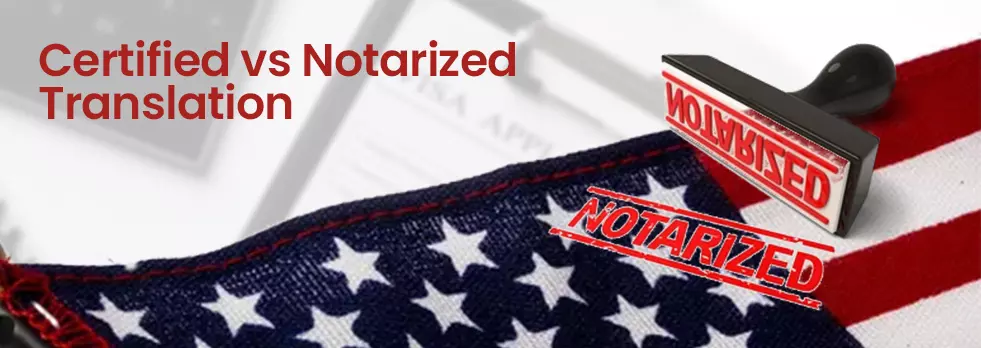
Document Translation Service – Certified vs Notarized
Certified vs Notarized Document Translation Service
In today’s globalized world, language barriers are a common occurrence. With so many people speaking different languages, it’s often necessary to translate documents and other materials from one language to another. This can be especially important in legal and official contexts, where the accuracy and authenticity of the translation can be crucial. Two terms that often come up in this context are “certified translation” and “notarized translation.” In this blog post, we’ll explore the difference between the two, and when you might need one or the other.
What is a Certified Translation?
A certified translation is a translation that has been completed by a professional translator who has been authorized by a government agency or professional organization to provide translations. The translator will usually attach a signed and stamped statement to the translation, indicating that they have accurately translated the document to the best of their abilities. This statement may also include the translator’s contact information and any relevant qualifications.
Certified translations are typically used in legal and official contexts, such as when submitting documents to a court, government agency, or academic institution. The certification is meant to ensure that the translation is accurate and reliable and that it can be trusted to be an accurate representation of the original document. In some cases, a certified translation may also be required to include a statement of accuracy from the translator, indicating that they have done their best to translate the document to the best of their abilities.
What is a Legalized or Notarized Translation?
A notarized translation or a Legalized translation is a translation that has been signed and stamped by a notary public, indicating that they have witnessed the translation and that it is accurate to the best of their knowledge. Notaries public is licensed professionals who are authorized to perform certain legal functions, such as witnessing the signing of documents and certifying the authenticity of signatures. In the case of a notarized translation, the notary is certifying that they have witnessed the translator’s work and that it is accurate to the best of their knowledge.
Notarized translations are typically used in similar legal and official contexts as certified translations, and they are often required for the same types of documents. However, notarized translations are not necessarily considered to be more reliable or accurate than certified translations. In some cases, a notary may simply be providing an additional layer of authentication, rather than verifying the accuracy of the translation itself.
Choosing between Certified and Notarized Translation
So, how do you decide whether you need a certified translation or a notarized translation? The answer depends on the specific requirements of the agency or organization you are submitting the documents.
When to get Certified document translation?
Some agencies or organizations may require a certified translation, In general, if you are submitting documents, including:
- To a court for legal requirements or proceedings,
- To government agencies or departments,
- To an academic institution,
- For business transactions.
A certified translation is more likely to be required. This is because these organizations often have strict requirements for the accuracy and reliability of translations, and they may only accept translations that have been completed by authorized professionals.
When to get Legalized document translation?
A Legalised Translation may be required for the documents that will be used in a foreign country. It is typically required for documents such as birth certificates, marriage certificates, and passports. On the other hand, if you are submitting documents to a private company or organization, a notarized or legalized translation can be more appropriate, as it provides an additional layer of authentication that can help to ensure that the translation is accurate and reliable.
It’s also worth noting that the cost of certified and notarised translations can vary widely depending on the language pair, the complexity of the document, and other factors. If you need to have a document translated, it’s a good idea to get quotes from several different translation providers and to ask about their certification and notarization processes or you can reach Worldwide Transcripts at +91-9340899870 to get your documents Certified or Notarized translated. This can help you to make an informed decision about which type of translation is best for your needs, and can also help you to ensure that you are getting a fair price for the service.
How to get a Certified Document Translation?
A certified translation(1) of a document can be done by any translation agency, and when choosing an agency candidates must make sure to appoint one with a reputation and has brief experience in providing a certified translation of documents.
Benefits of using a Certified Document translation service.
When you need precise and trustworthy translations for official or legal purposes, using a certified translation service has several advantages. The following are some major benefits of working with a certified translation service:
- Accuracy and quality:
Certified translation companies work with expert translators who are fluent in both the source and destination languages. These translators have the know-how to guarantee precise and excellent translations while preserving the document’s original content, tone, and context.
- Expertise in Specific sectors or disciplines:
Some certified translation services have expertise in particular sectors or disciplines, such as financial, legal, medical, or technical translations. These services use translators who have a specialised understanding of terminology and subject-matter experience to ensure correct translations of complicated or technical information.
- Confidentiality and data security
Confidentiality and data security are given top priority by accredited translation services. They have strong guidelines and security measures in place to secure the private information and sensitive data found in the papers you supply. When working with sensitive or legal documents, this is extremely important.
- Clarity and Formatting:
Qualified translation services can preserve standardised terminology and formatting throughout the translated materials. This is crucial for official papers, contracts, and academic transcripts since they must follow to formatting standards and be consistent.
- Time efficient:
Professional translation services have the infrastructure and resources required to undertake translation assignments effectively. When necessary, they can offer faster services and work within certain deadlines. When you have pressing translation needs or deadlines, this might be quite helpful.
- Support for Multiple Languages:
Numerous languages are frequently offered by certified translation services. As a result, you may avoid the trouble of coordinating with many vendors or agencies by having one supplier handle all of your translation needs.
For official or specialised reasons, employing a certified translation service provides accurate, dependable, and a widely acceptable translations. It gives you comfort, saves you time, and aids you in overcoming the difficulties presented by language limitations in a variety of business settings.
How to get a Legalized or Notarized document translation?
In general, the procedure to get Legalized or Notarized translation(2) of a document varies from nation to nation. Always search for an agency that is of good repute and has hands-on experience in the same as in legalised translation the document has to be signed sealed and attested by an appointed representative of the government.
Benefits of using a Legalized Document Translation service:
When you need translations for official documents that must be utilised in legal or governmental situations, using a legalised translation service, also known as a notarized translation service, may be advantageous in many ways. The following is a significant benefits of hiring a legalised translation service that is in addition to the advantages as mentioned in Certified Translation.
- Legal Acceptance:
Legalised translations are created especially for submissions to courts, immigration offices, government agencies, and other official entities. These translations go through a further process of notarization or legalisation, increasing their likelihood of being accepted and acknowledged as legitimate legal documents.
- Official document Certification:
Along with the translation itself, services for legalised translation also offer an official certification, often known as an affidavit, that attests to the veracity and correctness of the translation. Depending on the regulations of the nation or jurisdiction, a sworn translator or a notary public with a valid licence will normally sign and stamp this certification. The certification gives it an extra degree of legitimacy and guarantees that it complies with all applicable legal and administrative requirements.
- Legal Compliance:
Legalised translation services are knowledgeable about the particular guidelines and standards set by governmental organisations or judicial systems. They are knowledgeable about the legal system and can make sure that your translated papers adhere to all formatting, linguistic, and notarial standards.
- International Acceptance:
When dealing with cross-border transactions or circumstances involving many legal systems, legalised translations are especially crucial. They assist in removing linguistic barriers and guarantee that your documents will be accepted and recognised legally in other countries.
- Confidentiality & Data security:
Like certified translation services, legalised translation services place a high priority on data security and confidentiality. To secure your privacy and the sensitive information in the papers you send, they have strong procedures and safeguards in place.
By using a legalised translation service, you can be sure that your official papers are correctly translated, compliant with the law, and have the appropriate legal weight. It aids you in navigating the complexity of legal systems and guarantees that the appropriate authorities will accept and recognise your translated papers.
Conclusion
In conclusion, the main difference between a certified translation and a notarized translation lies in the authority that has certified the accuracy of the translation. While a certified translation is completed by a professional translator who has been authorized by a government agency or professional organization to provide translations and comes with a signed statement of accuracy, a notarized translation is a translation that has been signed and stamped by a notary public, indicating that they have witnessed the translation and that it is accurate to the best of their knowledge.
Ultimately, both certified and notarized translations provide an additional level of authentication that can help ensure the accuracy and reliability of the translation. If you need to have a document translated, it’s important to choose a reputable and qualified translation provider who can provide the level of certification that is required for your specific context. By doing so, you can ensure that your translated documents will be accepted and trusted by the intended recipients.
Why Trust Worldwide Transcripts ?
Being an authorised and verified source of documentation we have been successful on delivering translations to hundreds of clients till date, We have been a trusted name in the documentation procurement industry for over 13 years and have ties to more than 800+ universities in verifying and sending credentials electronically within 24 hours.
FAQ's
What is certified translation?
A translation that has been confirmed as accurate and comprehensive has been examined by a skilled translator. Legal and governmental translations must frequently be certified.
What does Legalized translation mean?
A certified translation that has been authorised by a government representative is known as a legalised translation. For usage in other nations, Legalized translations are often required.
What distinguishes a certified translation from a legalised translation?
A legalised translation has been confirmed by a government representative, which is the primary distinction between a certified translation and a legalised translation. This indicates that the government representative has confirmed the translation’s accuracy and thoroughness as well as the translator’s suitability to translate the document.
When would a certified translation be necessary?
A certified translation may be required for a number of reasons, such as:
applying for immigration or visa, legal document submission, submitting document to any academic institution or establishing a business transaction.
What documents are required to be Certified Translated?
Depending on the nation or jurisdiction, specific papers may need certified translations, which may include birth and marriage certificates, Death certificates and judgements of divorce, Academic records and diplomas, Naturalisation certificates, visa requests, and immigration papers, Commercial agreements. It is crucial to confirm whether a certified translation is necessary with the appropriate authorities in the nation or region where the document will be used.
Compared to legalised translations, are certified translations more expensive?
Several variables, such as the language pair, the complexity of the document, the length of the document, and the particular needs of the certification or legalisation procedure, might affect the cost of certified translations vs legalised translations. It’s crucial to keep in mind that the price of translation services varies depending on the supplier, therefore it’s a good idea to seek quotations from several translation services to compare the costs and services provided. However, it’s critical to place quality, dependability, and accuracy above cost when selecting a translation service, particularly when working with legal or official documents where accuracy is vital.
References
- “Certified Translation” – https://en.wikipedia.org/wiki/Certified_translation
- “Legal Translation” – https://dculs.dcu.ie/2021/05/24/what-is-a-notarised-translation







